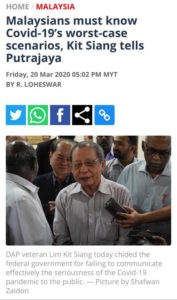WHEN SILENCE ISN’T GOLDEN – NO NEWS MEANS BAD NEWS DURING UNCERTAIN TIMES
WHEN SILENCE ISN’T GOLDEN
No News Means Bad News During Uncertain Times
 Uncertain times brought by the global COVID-19 pandemic has changed investor engagement as we know it. As we continue on in this era of social distancing, people are consuming vast amounts of news and information to stay informed whilst staying safe indoors. This has created a huge opportunity for companies to engage a captive audience using the tools and channels that are still conveniently accessible such as online media and news channels.
Uncertain times brought by the global COVID-19 pandemic has changed investor engagement as we know it. As we continue on in this era of social distancing, people are consuming vast amounts of news and information to stay informed whilst staying safe indoors. This has created a huge opportunity for companies to engage a captive audience using the tools and channels that are still conveniently accessible such as online media and news channels.
So although the Covid-19 pandemic has hit most businesses negatively, making the knee jerk reaction to stay quiet and lay low may be detrimental to your business. People are wary to buy from companies they no longer see or hear from. If your company has not been consistently engaged with your clients, investors or stakeholders recently, this is the best time to engage and connect, to prove that your company is post-Covid future ready.
Here’s why..
- Keeping your presence in the marketplace: Your company needs to stay relevant to your stakeholders. This means maintaining trust and letting them know how the company is doing. An absence of communications will leave your audiences with questions and perhaps lead to incorrect conclusions.
- Less noise in the marketplace means more attention space: A lull in the marketplace signals a good opportunity to reach out and gain more mindshare from your stakeholders and the investment community.
- Own your narrative or someone else will: Uncommunicative companies often give ground for competitors to take control of their narratives freely without checks.
- Set a platform for future success: Communicating well, frequently, transparently and thoughtfully with stakeholders sets your company apart during uncertain times. Meaning more stakeholder confidence and higher chance that your company will still be in the standing when the crisis ends.
So when the time comes for your company to announce how the company is doing in its quarterly earnings, a press release may prove to be the critical differentiator for your company.
Bearing in mind that the earnings press release is for all investors, not just the media, your company will need to ensure it gets the most value to make your press release count.
Here’s how..
- Think critically about how to tell your story: The earnings press release is the first glimpse investors will get of your company’s performance. Use it as a platform for your company to build your brand story that matches your brand identity and values.
- Present your company performance in the best light: Even though business performance is affected by the Covid-19 economic downturn, leveraging on the earnings releases to provide honest representations of your company’s position and key messages in the most accurate and beneficial manner possible will bring reassurance to your stakeholders.
- Give guidance for the future: Use the earning press release to engage clients, and to influence your investors and the public about the vision of your company and its plans in the upcoming year or quarter. This guidance is important because it lets your stakeholders know what they can expect from the company in the near future.
- Seek expert advice to carefully craft your press releases: Working with an effective public relations agency is also (of course) a good idea. They can bring a more objective view of your story angles and key messages.
Sooner or later, the Covid-19 pandemic will end. Ultimately, your communication strategies should align to what your company wants to achieve in the post-COVID future.
THE ARRIVAL OF VIRTUAL AGMS
THE ARRIVAL OF VIRTUAL AGMS
 As businesses adjust to the shaky times brought about by the COVID-19 pandemic, corporate Malaysia has been encouraged to turn their annual general meetings (AGMs) into virtual events.
As businesses adjust to the shaky times brought about by the COVID-19 pandemic, corporate Malaysia has been encouraged to turn their annual general meetings (AGMs) into virtual events.
Some of us will welcome this change, some of us won’t. What is certain is that with the advancement of technology and globalisation in corporations, virtual meetings is a step towards a certain future that was perhaps, merely fast forwarded by the pandemic.
Regardless of circumstance, corporate Malaysia should be sitting up and paying attention to the ins and outs of a virtual AGM. Coordinating a virtual or even a hybrid AGM is similar to directing a movie whereby you select the main actors, scenes, script, as well as ensuring quality audio and visual. The mission is ensuring the ‘show’ is run as smoothly and efficiently as possible, while delivering the right messages to your audience.
Here are some things to keep in mind:
-
Infrastructure
Ensure a stable platform and practical setup i.e. feasible & user-friendly software, strong internet connection especially at broadcast venues. Technical support personnel should be present at the broadcast venue for any required assistance. For example, TNB recently announced a virtual AGM which will be conducted via a platform specialised for AGMs – Lumi AGM.
-
Moderator
The right moderator makes a huge difference – A sharp, alert, unbiased moderator with a strong grasp on the organisation’s goals and objectives would be able to direct the conversation in the right direction.
-
Familiarity / Technology-savviness
All presenting parties should be familiar with the system / software to ensure smooth presentation and reduce lagging time.
-
Roles & SOPs
Clearly assign roles i.e. assigning Chairman / CEO as main and supporting presenter. Provide clear and direct instructions to ensure shareholders are well informed of the SOPs for their remote participation, questioning and voting.
-
Screen time
Ensure time is allocated between main screen and alternative screens, well rehearsed and everybody is aware of the allocated screen time.
-
Visuals
Portray a clean and polished visual – ensure that there is sufficient space and social distancing amongst the presenting parties.
-
Teamwork
Ensure there is good communications between the team on the screen and behind the scenes.
With the AGM season underway many, the Securities Commission (SC) has issued a guidance note for public listed companies (PLC) on the conduct of fully virtual general meetings. The guidelines include:
-
Virtual meetings should be conducted with as few individuals physically present as possible
-
There should not be more than 8 essential individuals physically present at the broadcast venue
-
This should include the Chairperson of the general meeting, Chief Executive Officer, Chief Financial Officer, company secretary, auditor as well as audio-visual support
-
Those present must observe all social distancing SOPs and guidelines as provided by the government
-
Companies can submit an application to the SC for a time-limited travel exemption for the essential individuals to travel to the broadcast venue for the fully virtual meetings
As we continue on in this era of social distancing, maximise the tools and channels that are still accessible to you. A good strategy and successful execution of AGM may go a long way in delivering your company’s messages to your shareholders.
Written by: Atiq Safirah (June 2020)
MALAYSIANS NEED CASH INJECTIONS NOW TO SURVIVE COVID-19 ECONOMIC DISASTER

MALAYSIANS NEED CASH INJECTIONS NOW TO SURVIVE COVID-19 ECONOMIC DISASTER
COMMENTARY, March 20 — The government needs to put cold hard cash into the rakyat’s hands today. Right now.
Freezing the monthly tax deductions (PCB) is a start, followed by freezing the CP204 advance tax paid by businesses. Next, the government should reverse all the PCB and CP204 paid for the last 12 months.
This is a measure that is easily within the government’s ability. There’s no need for people to apply for anything, qualify for anything, to find the right form. Just press the button, and send that money back to where it came from in this dire time of need.
Reversing PCB directly to the employees will put money in their pockets, to use on their children, on sick parents, on paying for necessities for the next few months. Reversing the CP204 will allow businesses to keep paying wages and salaries, to pay suppliers so that they in turn can pay their wages and salaries and pay their suppliers.
This is one way of cutting the impact of a cash crunch. The first stimulus package of RM20 billion was probably adequate at the time then-prime minister Tun Dr Mahathir Mohamad announced it.
The recent addition of another few billion ringgit announced by Prime Minister Tan Sri Muhyiddin Yassin will not really make a difference. The lockdown has changed everything.
The most immediate measures that will bring relief is to stop sucking cash out of the economy and out of businesses’ accounts. This cash should stay in the economy and be used to keep people alive. Don’t let “experts” tell you anything different.
Without a cash injection, there will be widespread failure of businesses. Many small businesses will fail, and with them that part of the economy that they keep alive — small hawkers who pay dishwashers a daily wage, small firms who pay dispatch riders and cleaners and newspaper delivery men.
If anything, the government should consider giving an immediate increase in salary to the people on the front lines, especially those on the lower pay rungs. All the emergency personnel — police, Bomba, paramedics, nurses, orderlies, hospital staff and assistants — they should be paid more.
Do not talk about raising government revenue, do not talk about 1MDB bonds, do not talk about deficits. Talk about reassuring people that you know what you’re doing, and you know what the economy needs and immediate cash injection.
Do not talk about whether the government can afford it. To quote Nobel Laureate Joseph Stiglitz, the American economist: “When the US was attacked during the Second World War, no one asked, ‘Can we afford to fight the war?’ It was an existential matter. We could not afford not to fight it.”
What is the government for if not for this, to help us shoulder the burden of tough times? Why do we pay taxes if not to have a leader who will pull us all together and bring us through the coming adversity.
* Lee Siew Lian is a small business owner who also reads Malay Mail.
Link to article:
https://www.malaymail.com/news/malaysia/2020/03/20/malaysians-need-cash-injections-now-to-survive-covid-19-economic-disaster/1848361
LIM KIT SIANG: TELL MALAYSIANS ABOUT THE WORST-CASE SCENARIO ABOUT THE COVID-19 CRISIS
 Media Statement by DAP MP for Iskandar Puteri Lim Kit Siang on Friday, 20th March 2020 that mentions our Director Lee Siew Lian (head towards the end of the article to spot it.)
Media Statement by DAP MP for Iskandar Puteri Lim Kit Siang on Friday, 20th March 2020 that mentions our Director Lee Siew Lian (head towards the end of the article to spot it.)
TELL MALAYSIANS THE WORST-CASE SCENARIO ABOUT THE COVID-19 CRISIS
Global news about the Covid-19 pandemic continues to be bleak and ominous.
Italy passed a grim milestone yesterday when its deaths linked to the virus soared to 3,405, exceeding the toll of 3,248 deaths in China, where the virus first broke out.
Cemeteries in the northern city of Bergamo were so overwhelmed that troops were called in to transport bodies elsewhere to be cremated. The army sent 120 doctors and health professionals to help in Bergamo and nearby Lodi, while field hospitals and emergency respiratory units were being set up elsewhere in the north.
The spread of the virus in Italy had been swift and terrifying, even after the country imposed strict limits on people’s movements. As the death toll rose, traditional funeral services were outlawed as part of the national restrictions against gatherings.
The country tallied 902 deaths in the last two days alone: 475 Wednesday and 427 on Thursday. Most who died had serious pre-existing conditions. Italy now has 41,035 coronavirus cases.
In the United States, the Governor of California, Gavin Newsom ordered California’s almost 40 million residents to stay home except for essential trips, after 1,040 cases of the coronavirus had been identified and 19 people had died.
Newsom earlier said the state was projecting that 56 percent of California’s population would be infected with the virus over an eight-week period — a stunning disclosure that rippled through headlines as it would work out to 22.4 million cases. But Newsom later said he hoped that the extraordinary measures he proposed in California would stop those projections from coming to pass.
Even London is considering a lockdown over the Covid-19 pandemic, as United Kingdom joins ten countries with the most number of Covid-19 deaths with a global death toll of 10,028 – Italy (3405), China (3,248), Iran (1,284), Spain (831), France (372), United States (200), United Kingdom (144), South Korea (94), Netherlands (76) and Germany (44).
At least, 245,049 people have been infected globally, with seven countries having exceeded 10,000 cases – China (80,967), Italy (41,035), Iran (18,407), Spain (18,077), Germany (15,320), United States (13,800) and France (10,995).
When the Prime Minister, Tan Sri Muhyiddin Yassin announced the Movement Control Order (MCO) on Monday night, he failed to explain the seriousness of the epidemic and importance to break the chain of infection of the Covid-19 virus. Even his second live telecast two days later was not a full success either.
The nation is at war with the Covid-19 virus and the Government must communicate fully and effectively to all Malaysians – including sharing with all Malaysians the worst-case scenarios about the Covid-19 crisis.
It is important that the Prime Minister and all Ministers earn the trust and confidence of all Malaysians that they are capable and competent to wage and win this war and this is why good suggestions should be deliberated and acted upon without delay by the government.
Many good and constructive suggestions as to how to fight and win this war have been made today itself, like the following:
1. Proposal by former women, family and community development minister Dr Wan Azizah Wan Ismail and her former deputy Hannah Yeoh that the government provide additional allocation for frontliners who are risking their lives in the battle against Covid-19; and
2. Ideas by small business owner Lee Siew Lian in an article today in the Malay Mail online entitled “Malaysians need cash injections now to survive Covid-19 economic disaster”, in particular her proposal to the Minister of Finance to reverse all the PCB and CP204 paid for the last 12 months.
Lim Kit Siang
TAMPONS, GST AND WHY SST WILL GIVE US MORE SPENDING MONEY
TAMPONS, GST AND WHY SST WILL GIVE US MORE SPENDING MONEY
Published article here:
https://www.malaymail.com/news/malaysia/2018/07/22/tampons-gst-and-why-sst-will-give-us-more-spending-money/1654700
KUALA LUMPUR, July 22 — I have been reeling from painful flashbacks since the debate began raging over the different pros and cons of the much-hated Goods and Service Tax (GST) and the impending Sales and Services Tax (SST).
In these recollections, my business partners and I are staring at an Excel spreadsheet, tearing the hair from our heads and moaning piteously. We were woefully unprepared and, like pretty much every Malaysian enterprise big and small in late 2015, we ran right into a brick wall.
Our little public relations consultancy had a cash flow problem. We were profitable, but the government of Malaysia was sitting on our cash.
As the collection agents for former prime minister Datuk Seri Najib Razak’s administration — thanks, man! — We invoiced our clients the requisite 6 per cent GST. Then we had to pay, in real money, the amount of GST invoiced because the tax had been incurred, even though we had not yet been paid.
We resentfully passed to the Customs Department our cold, hard cash, in advance. Then we waited for our clients to pay us. But of course they were in the same boat. We all were. Up and down the supply chain, from the Bursa Malaysia-listed companies to the neighbourhood mini-market, we were all transferring cash from our bank accounts to the government.
I’m sure the Customs Department didn’t mean to be slow in making refunds. And, maybe we shouldn’t have extended reasonable payment terms. Why give 30-, 60-, or 90-day payment terms to clients and customers when we should have said, “pay us yesterday please”. Right?
Anyway, now we know why our little ringgit was so desperately needed. But while the government’s debts — thanks, 1MDB! — were being serviced, my partners and I went without our salaries — thanks, Jho!
I’m sure other business people out there did too. We drew down on savings and racked up some personal debt but we survived. We didn’t have to fire anyone, but there must have been some who did. Others didn’t replace staff who retired or give jobs to fresh graduates. Or maybe they didn’t buy the machinery they needed or didn’t restock their inventory.
Even now, I feel anxious recalling those times. I remember reading about a neighbourhood sundry shop, a family-owned business run by an elderly couple who were probably getting by okay until GST ate up all their money.
I remember quiet shopping centres and empty cinemas. I remember I thought I got too little change from a 7-Eleven cashier, and then realised “oh, it’s the GST”. I remember the first time I paid GST for tampons.
I remember when nothing I bought in a supermarket or a pharmacy was taxed, nor my panties and bras, nor my spectacles. There must be parents who remember when disposable diapers were not taxed. Or colouring pencils. Or ball point pens. Or school shoes. Or slippers. My Muslims friends will remember the days when they didn’t pay GST on prayer rugs, or tudung kepala or prayer beads.
Ya, ya, ya, GST is a more efficient, more transparent tax. Being able to claim back a portion of GST was supposed help businesses reduce the cost of making goods and providing services. These cost savings were supposed to have been passed on to consumers.
So what if the SST will be hidden in the final price we pay at the till, and we won’t know exactly how many ringgit and sen that is.
But we do know the Mahathir administration’s SST is expected to cost a whopping RM20 billion less — LESS — than Najib’s GST. That’s RM20 billion that will stay in the economy, circulating, generating jobs, paying salaries, feeding families.
From the first day of September, I’m going to have to put the SST on our invoices to our clients. But then I’m going to the supermarket, and I won’t have to pay GST on mosquito coils, and brooms, and mops, and feather dusters, and senduk and matches. And tampons. Thanks, Doc!
* Lee Siew Lian is a former financial journalist and is currently a public relations consultant. She is also a Malay Mail reader.
